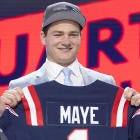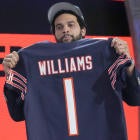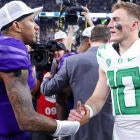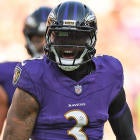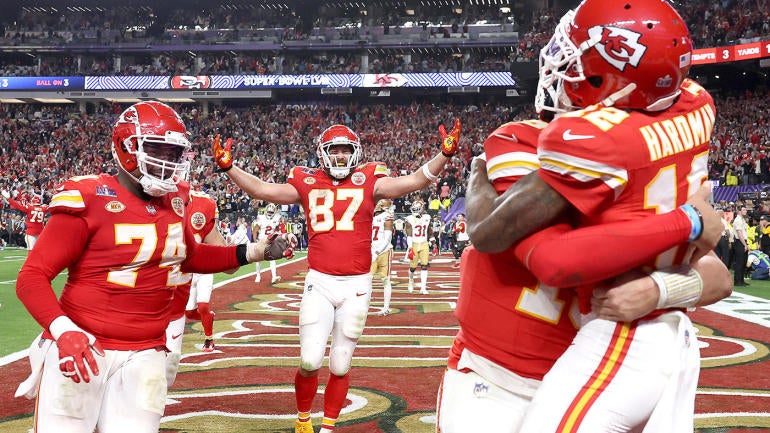
With their win in Super Bowl LVIII, Patrick Mahomes and the Kansas City Chiefs have officially become NFL's second dynasty since the turn of the century, five years removed from the New England Patriots' final Super Bowl win.
If you weren't sure before, there's no denying the Chiefs' place in history now. While several teams have won two Super Bowls, very few have managed to win three Super Bowls. The Chiefs have now joined the exclusive fraternity, a fraternity that includes some of the greatest teams of all time.
You can see below where the Chiefs currently sit in history following their 25-22 win, but first, here was the criteria used when putting this list together.
- Championships won
- Sustained run of excellence
- Players/coaches
- Enduring legacy
1. New England Patriots (2001-18)
No dynasty can match what the Patriots put together during the first two decades of the millennium. In all, Bill Belichick's team won six Super Bowls, nine AFC titles, and 17 division titles. The Patriots also completed the only 16-0 regular season in NFL history in 2007.
The Patriots won three Super Bowls in a four-year span from 2001-04. After a 10-year hiatus (that included two heartbreaking losses to Eli Manning's Giants), New England won three Super Bowls in a five-year span from 2014-18. The common denominator during the Patriots' reign was Belichick and quarterback Tom Brady, who took home MVP honors during four of his six Super Bowl wins in New England. Three of Brady's former teammates, defensive lineman Richard Seymour, cornerback Ty Law and receiver Randy Moss, have been enshrined in the Pro Football Hall of Fame. Former Patriots tight end Rob Gronkowski will be fitted for a gold jacket sometime in the very near future.
Why they're No. 1: The Patriots' sustained success is remarkable considering it took place during the NFL's salary cap era. New England also overcame a slew of worthy competitors that includes Peyton Manning's Broncos and Colts, as well as Ben Roethlisberger's Steelers. Patriots detractors can point to the team playing in the underwhelming AFC East along with the fact that they endured Spygate and Deflategate. Controversies aside, no one can argue with the Patriots' unparalleled success.
For the first time, @TomBrady and the @Patriots were Super Bowl Champions. #OTD in 2002, New England entered Super Bowl XXXVI as 14-point underdogs, before securing victory against the Rams in the game's closing moments and launching a dynasty.
— Pro Football Hall of Fame (@ProFootballHOF) February 3, 2023
📹: @NFL pic.twitter.com/YAa5L79uu5
2. Pittsburgh Steelers (1972-79)
After nearly 40 years of losing, the Steelers soared to uncharted heights during the 1970s. Led by team president Dan Rooney, head coach Chuck Noll, and a talented scouting department that included 2021 Hall of Fame inductee Bill Nunn, the Steelers constructed arguably the most talented roster in pro football history. During Noll's first four drafts, the Steelers selected five future Hall of Famers and 15 future starters, a list that includes Joe Greene, Terry Bradshaw, Mel Blount, L.C. Greenwood, Dwight White, Ernie Holmes, Gerry Mullins, Larry Brown and Jack Ham. In 1972, the selection of running back Franco Harris spearheaded the Steelers to their first division title and playoff victory, won on Harris' "Immaculate Reception."
Harris lifted Pittsburgh to the playoffs, but it was the Steelers' 1974 rookie class -- a class that featured five future Hall of Famers in Jack Lambert, Lynn Swann, John Stallworth, Mike Webster and Donnie Shell -- that put Pittsburgh over the top. From 1974-79, the Steelers posted an 80-22-1 record, won six division titles and became the first team to win four Super Bowls. The Steelers are also the only team to win back-to-back Super Bowls twice and four Super Bowls in a six-year span. Two of Pittsburgh's Super Bowl wins came against the mighty Dallas Cowboys, the other great team of the 1970s. Along with Art and Dan Rooney, Noll and Nunn, the 1970s Steelers boasted 10 Hall of Fame players and several other players who have received Hall of Fame consideration.
Why they're No. 2: The Steelers dominated an era that included Don Shula's Dolphins, Tom Landry's Cowboys, and John Madden's Raiders. The Steelers' success not only made Pittsburgh a football-crazed city, it helped popularize the NFL nationwide during a time when pro football firmly surpassed baseball as America's new pastime. Furthermore, while the Patriots have the greatest run of success in NFL history, the 1970s Steelers continue to hold the mantle as the greatest team of all-time, a team that went 4-0 in Super Bowl competition.
No. 39: 1979 @steelers, @SuperBowl XIV Champions #HereWeGo
— NFL (@NFL) November 9, 2019
📺: #NFL100 Greatest Teams on @NFLNetwork pic.twitter.com/vcu9hDlO52
3. Green Bay Packers (1960-67)
Green Bay had been mired in mediocrity the 14 seasons prior to Vince Lombardi's arrival. During his nine years as the Packers' coach, Green Bay tallied a 98-30-4 record that included a 9-1 record in the postseason. From 1960-67, Lombardi's Packers played for the NFL title six times, with the only loss coming against the Eagles in 1960. After winning back-to-back titles in 1961-62, Green Bay became the second NFL team (the 1929-31 Packers being the first team) to win three consecutive titles, including the first two Super Bowls. No team has since won three consecutive titles.
There was no NFL play more devastating during the 1960s than the legendary "Packer Sweep," a play that often saw halfbacks Jim Taylor, Paul Hornung and Elijah Pitts follow the blocking of guards Forrest Gregg and Jerry Kramer. Green Bay also possessed a steady passing attack, led by quarterback Bart Starr. An often overlooked facet of the '60s Packers was their dominant defense, led by Hall of Famers Willie Davis, Dave Robinson, Ray Nitschke, Herb Adderley and Willie Wood.
Lombardi's college connections were one of the reasons why he able to construct one of the greatest teams in pro football history. His willingness to draft Black players in the first round, something that was uncommon at that time, also helped him build a team that would win five titles in a seven-year span while serving as a trailblazer in the process.
Why they're No. 3: While they won more titles in one decade than any team in history, the Packers played in the 12-team NFL during their run. They only had to play in one postseason game (the NFL Championship game) during their first two championship runs. Green Bay also didn't have to deal with the AFL until the first two Super Bowls, where they dispatched the Chiefs and Raiders by a combined score of 68-24.
No. 13: 1966 @packers, @SuperBowl I Champions #GoPackGo
— NFL (@NFL) November 16, 2019
📺: #NFL100 Greatest Teams on @NFLNetwork pic.twitter.com/cFDf0t48iW
4. San Francisco 49ers (1981-94)
Former 49ers executive Carmen Policy has often referred to San Francisco during the 49ers' dynasty as Camelot. He wasn't too far off, as the 49ers enjoyed a magical run that ultimately led to the franchise becoming the first to win five Vince Lombardi Trophies. Led by Bill Walsh's innovative West Coast offense, the 49ers were tabbed as the team of the '80s after winning Super Bowls XVI, XIX, and XXIII. In 1989, under first-year head coach George Seifert, the 49ers dismantled the Broncos in Super Bowl XXIV. The '90 49ers were a field goal away from possibly becoming the first team to win three consecutive Super Bowl titles. San Francisco never won three straight, but they did win their fifth title after Steve Young led the 49ers to a dominant win over the Chargers in Super Bowl XXIX.
Young followed Joe Montana, who went 4-0 in Super Bowls while becoming the first player to win three Super Bowl MVP awards. Both quarterbacks had substantial success throwing the ball to Jerry Rice, who is regarded as the greatest receiver of all time. The 49ers' offense also featured halfback Roger Craig, the first player to post 1,000 yards rushing and receiving in the same season. Like the Packers, the 49ers boasted a vastly underrated defense, led by Hall of Fame safety Ronnie Lott, fellow defensive backs Eric Dwight and Dwight Hicks, and linebackers Charles Haley, Jack "Hacksaw" Reynolds and Keena Turner.
Why they're No. 4: While Walsh's innovative offense has left an indelible imprint, the 49ers' dynasty has not had the same lasting impact as the Packers and Steelers' dynasties. The 49ers also endured a shocking playoff loss to the Vikings in 1987 (which nearly cost Walsh his job) and two devastating playoff losses to Bill Parcells' Giants. Seifert's 49ers then lost back-to-back NFC title games to the Cowboys before breaking through in 1994.
"That team was just loaded!" 💪
— NFL Network (@nflnetwork) November 16, 2019
The 1984 @49ers went 15-1 and became Super Bowl champs 🏆👇 #NFL100
📺: NFL 100 GREATEST TEAMS on NFL Network pic.twitter.com/ZaSjEPJOW4
5. Kansas City Chiefs (2019-present)
Andy Reid's team earned a seat at this exclusive table after winning Super Bowl LVIII. They joined the '70s Steelers, '90s Cowboys, '00s and '10s Patriots as the only teams to win three Super Bowls over a five-year span.
The Chiefs' recent run of success is even more impressive considering that it is happening during the Super Bowl era. Kansas City joined the Patriots as the only teams this century to play in four Super Bowls over a five-year span. It did so after winning the first two road playoff games of Mahomes' career. In Super Bowl LVIII, they overcame a 10-point deficit against a talented 49ers team before winning the second overtime in history.
Why they're No. 5: Kansas City has one of the game's all-time great coaches in Reid, the best quarterback in today's NFL in Mahomes, and a future Hall of Fame tight end in Travis Kelce. They also have other elite players like offensive linemen Creed Humphrey and Joe Thuney, defensive lineman Chris Jones, as well as a slew of other talented players who continue to play integral roles in their success.
6. Dallas Cowboys (1991-95)
In just three years, Jimmy Johnson and Jerry Jones helped turn the Cowboys from a 1-15 outfit to Super Bowl champions. How did they do it? By forcing several popular yet aging veterans into retirement, making a slew of successful draft picks, and putting an emphasis on team speed. Oh yeah, Johnson also pulled off the "Great Train Robbery" when he shipped running back Herschel Walker to the Vikings in a trade that include three future first-round picks and three future second-round picks. Among the players the Cowboys acquired with the picks included Hall of Fame running back Emmitt Smith, perennial Pro Bowl safety Darren Woodson, Pro Bowl defensive tackle Russell Maryland, and cornerback Kevin Smith.
Johnson won Coach of the Year after the Cowboys went 7-9 in 1990. After reaching the divisional round of the playoffs in 1991, the 1992 Cowboys won a franchise-record 13 regular-season games on the strength of the league's top-rated scoring defense and the play of Smith, quarterback Troy Aikman and receiver Michael Irvin. The Cowboys then dispatched the mighty 49ers in the NFC title game before defeating the Bills by 35 points in Super Bowl XXVII. Dallas successfully defended its championship in 1993 before Johnson left the Cowboys less than two months after winning back-to-back titles. With Barry Switzer as head coach, Dallas became the first team to win three Super Bowls in a four-year span after defeating the Steelers in Super Bowl XXX.
Why they're No. 6: At the height of their powers, the 1990s Cowboys are right up there with the best teams in league history. The defense was dominant and the Cowboys' offense (which also included the "Great Wall of Dallas" offensive line) was one of the most complete units of all time. But Johnson's departure led to a premature ending to one of the NFL's great dynasties; the Cowboys were a 6-10 team two years after winning Super Bowl XXX, and would not win another playoff game until 2009.
No. 6: 1992 @dallascowboys, @SuperBowl XXVII Champions #DallasCowboys
— NFL (@NFL) November 16, 2019
📺: #NFL100 Greatest Teams on @NFLNetwork pic.twitter.com/yjgdWAptrC
7. Oakland/Los Angeles Raiders: 1967-85
No NFL team enjoyed more consistent success than the Raiders during this span. During this 18-year run, the Raiders won 11 division titles, earned 15 playoff berths, captured one AFL title and three Super Bowls. Under owner Al Davis, the Raiders earned their still-standing reputation as the NFL's bad boys, with tough guy players that included Ken Stabler, George Blanda, Jack "The Assassin" Tatum, George Atkinson, Skip "Dr. Death" Thomas, Ted Hendricks, Phil Villapiano, Matt Millen, John Matuszak, and Howie Long.
The Raiders' roster also included receivers Fred Biletnikoff and Cliff Branch, tight end Dave Casper, and offensive lineman Jim Otto, Art Shell and Gene Upshaw. The '76 Raiders captured the franchise's first Super Bowl after going 13-1 during the regular season. They then dismantled the defending two-time champion Steelers in the AFC title game before routing the Vikings in Super Bowl XI. Four years later, coach Tom Flores and quarterback Jim Plunkett helped the Raiders become the first franchise to win the Super Bowl as a wild-card team. The '83 Raiders, on the strength of running back Marcus Allen and cornerbacks Lester Hayes and Mike Haynes, held Washington's record-setting offense to just one touchdown in the Raiders' 38-8 win in Super Bowl XVIII.
Why they're No. 7: The Raiders spent the first half of their run playing second-fiddle to some of the era's other great teams. After losing Super Bowl II, the Raiders fell short in six conference title games from 1968-75. Two of those losses came at the hands of the Steelers, who also defeated the Raiders on the strength of Franco Harris' "Immaculate Reception."
No. 8: 1976 @Raiders, @SuperBowl XI Champions #RaiderNation
— NFL (@NFL) November 16, 2019
📺: #NFL100 Greatest Teams on @NFLNetwork pic.twitter.com/9Z1krnInXz
8. Dallas Cowboys (1970-79)
We could have included the late '60s and early '80s, but the true impact of that era of Cowboys' football took place in the '70s. During that span, the Cowboys played in five Super Bowls, winning two and losing three others by a combined total of 11 points. Led by Tom Landry and Roger Staubach, the Cowboys' popularity soared to such heights that they were eventually crowned as "America's Team."
After falling short short of a title in 1970, the '71 Cowboys -- a loaded roster that included Staubach, Bob Lilly, Bob Hayes, Lance Alworth, Duane Thomas, Walt Garrison, Rayfield Wright, Mike Ditka, Chuck Howley, Herb Adderley, Mel Renfro and Cliff Harris -- won the franchise's first title after dismantling the Dolphins (the same team that went undefeated the following season) in Super Bowl VI. The Cowboys seamlessly transitioned during the decade, drafting future stars that included Drew Pearson, Randy White, Harvey Martin, Tony Dorsett, Thomas "Hollywood" Henderson and Ed "Too Tall" Jones. In 1977 Cowboys' "Doomsday" defense outplayed the Broncos' "Orange Crush" defense in Super Bowl XII, 27-10. In the win, Martin and White became the first -- and only -- Super Bowl co-MVPs.
Why they're No. 8: The '70s Cowboys certainly classify as a dynasty, but their 2-3 record in Super Bowls is underwhelming. Two of those losses came at the hands of the Steelers, with the second Super Bowl matchup (Super Bowl XIII) ultimately giving Pittsburgh the title as the "Team of the '70s."
No. 17: 1977 @dallascowboys, @SuperBowl XII Champions #DallasCowboys
— NFL (@NFL) November 16, 2019
📺: #NFL100 Greatest Teams on @NFLNetwork pic.twitter.com/CEkuoBJxTn
9. Washington (1982-91)
Washington had won just two playoff games in the previous 37 years before hiring Joe Gibbs in 1981. Over the next 10 years, Gibbs' Washington team won 17 playoff games, four conference titles and the franchise's three Super Bowls. Making Washington's success during this span even more impressive is the fact that the Football Team played in the ultra competitive NFC, a conference that also included Bill Walsh's 49ers, Mike Ditka's Bears, and Bill Parcells' Giants.
Gibbs won each of his Super Bowls with a different quarterback. Joe Theismann, John Riggins and the "Hogs" offensive line led Washington to its first title in 1982. While they were dethroned by the Raiders in the following year's Super Bowl, Washington returned to prominence in 1987 on the strength of quarterback Doug Williams' MVP performance in Super Bowl XXII. In Super Bowl XXVI, the MVP performance of quarterback Mark Rypien led Washington to a 37-24 win over Buffalo.
Each quarterback enjoyed talented receiving corps, led by Art Monk, Gary Clark, Charlie Brown, and Ricky Sanders. Gibbs' teams also featured stingy defensive units that featured Darrell Green, Dexter Manley, Charles Mann, and Wilber Marshall.
Why they're No. 9: Washington would have possibly placed higher if not for Super Bowl XVIII. Arguably their best team during the '80s, Washington's '83 team ripped through the NFL during the regular season while setting a then-NFL record for points scored. But not only did they fail to successfully defend their title, Washington was whitewashed by the Raiders in the Super Bowl, 38-9.
No. 54: 1982 @Redskins, @SuperBowl XVII Champions #HTTR
— NFL (@NFL) November 9, 2019
📺: #NFL100 Greatest Teams on @NFLNetwork pic.twitter.com/pHZUq8wlc4
10. Miami Dolphins (1970-74)
Miami went 15-39-2 during its first four years of existence. During Don Shula's first five years in Miami, the Dolphins went 62-15-1. The first team to play in three consecutive Super Bowls, the Dolphins also completed the NFL's only perfect season, going an unblemished 17-0 in 1972. During a two-year span, Miami went 32-2 en route to winning back-to-back Super Bowls.
Shula's Dolphins were powered by their "No Name" defense, led by Nick Buoniconti, Manny Fernandez, Jake Scott, Dick Anderson and Bill Stanfill. The Dolphins also possessed a powerful rushing attack that featured Larry Csonka, Mercury Morris and Jim Kiick. When they did throw the ball, quarterback Bob Griese had great success getting the ball to receiver Paul Warfield, a member of the NFL 100 All-Time Team. Miami's offensive line was powered by Hall of Fame guard Larry Little, center Jim Langer and guard Bob Kuechenberg. The line paved the way for Csonka and Morris to become the first pair of teammates to both run for over 1,000 yards in the same season.
Why they're No. 10: Like the '70s Cowboys, the Dolphins' lack of longevity hurt them on this all-time list. The short-lived World Football League -- which whisked away Csonka, Kiick and Warfield in 1975 for a cool $3 million -- largely contributed to the Dolphins' run ending following a gut-wrenching loss to the Raiders in the '74 playoffs.
No. 28: 1973 @MiamiDolphins, @SuperBowl VIII Champions #FinsUp
— NFL (@NFL) November 16, 2019
📺: #NFL100 Greatest Teams on @NFLNetwork pic.twitter.com/IKFERgZOir














